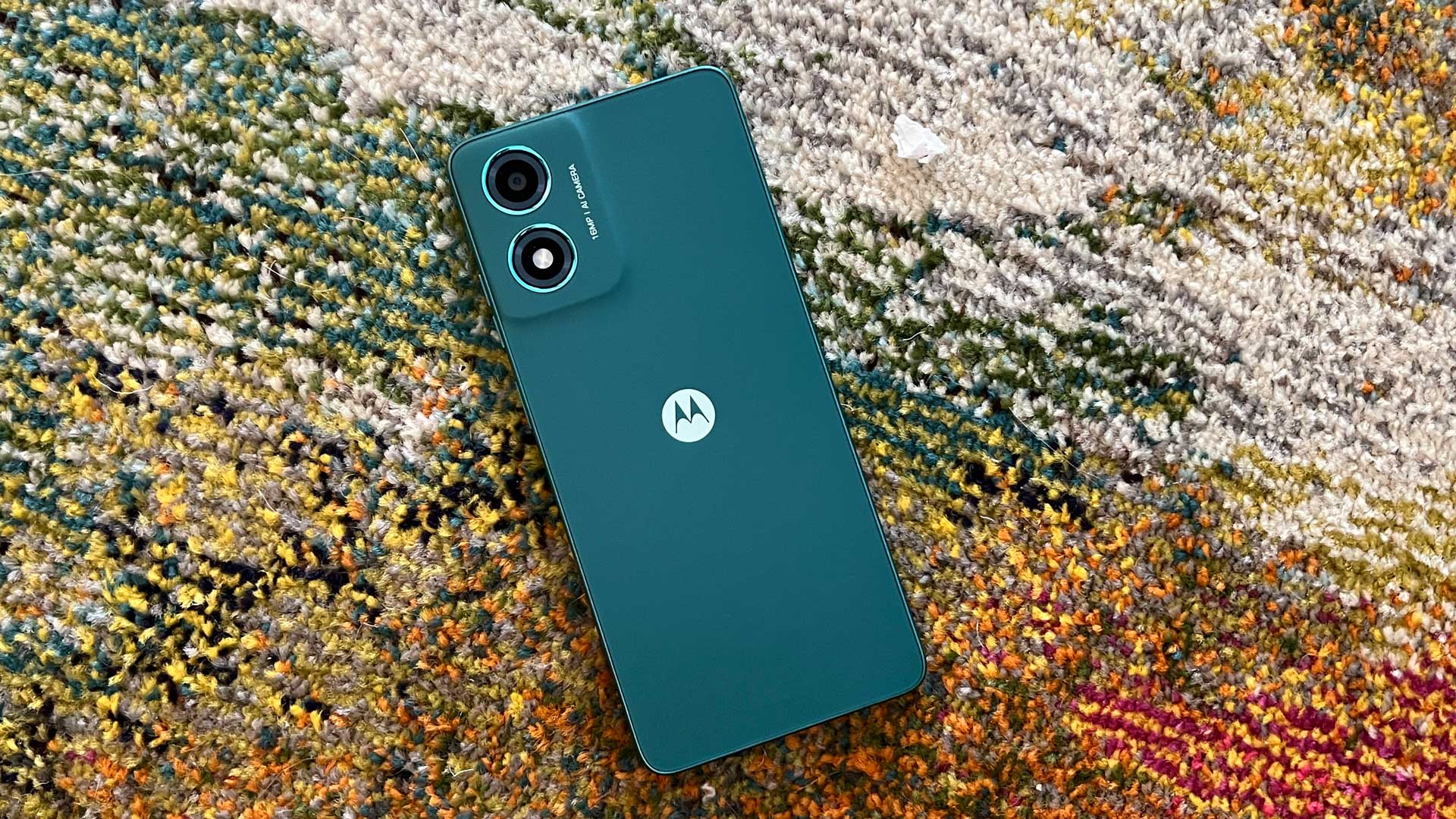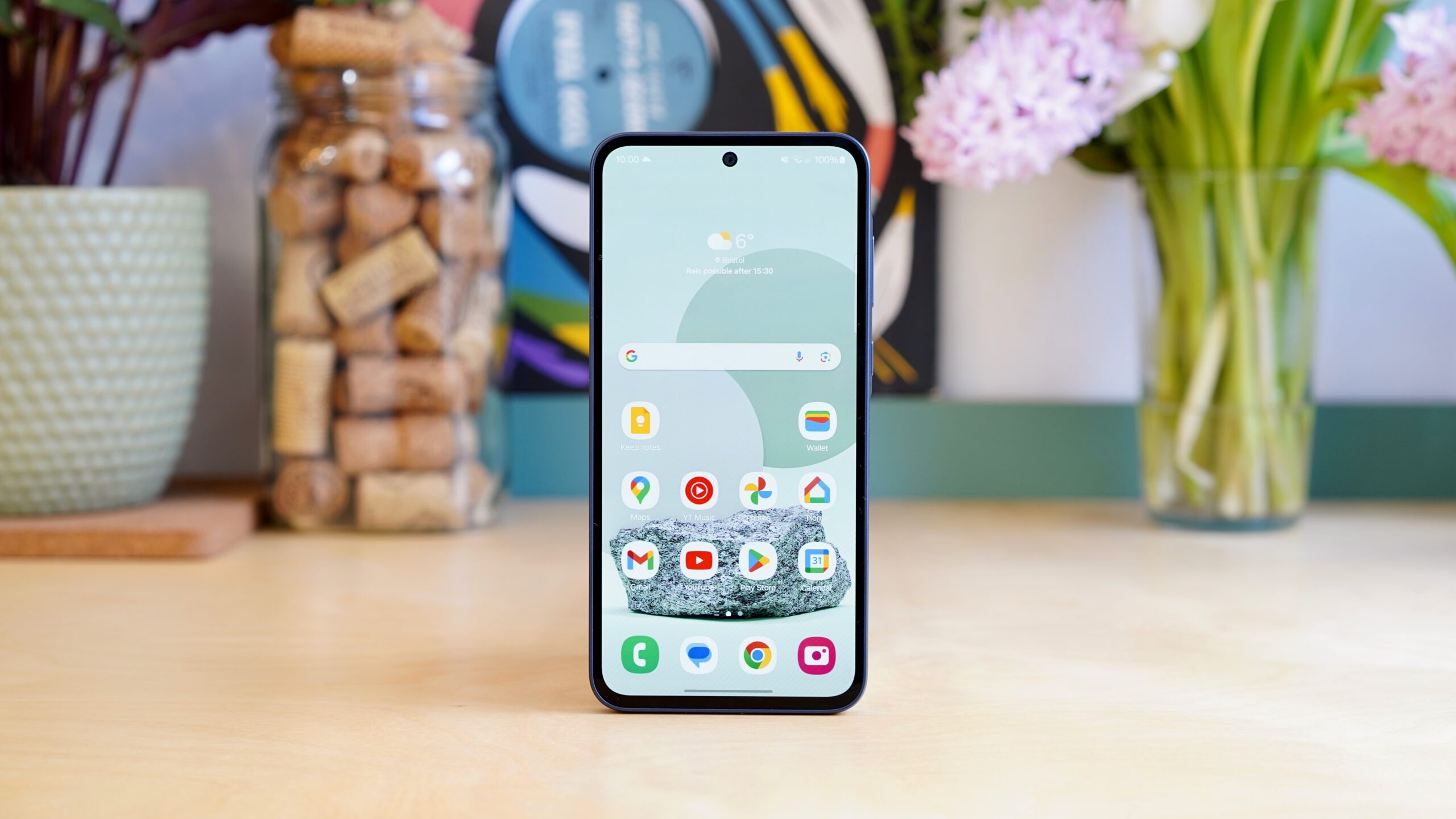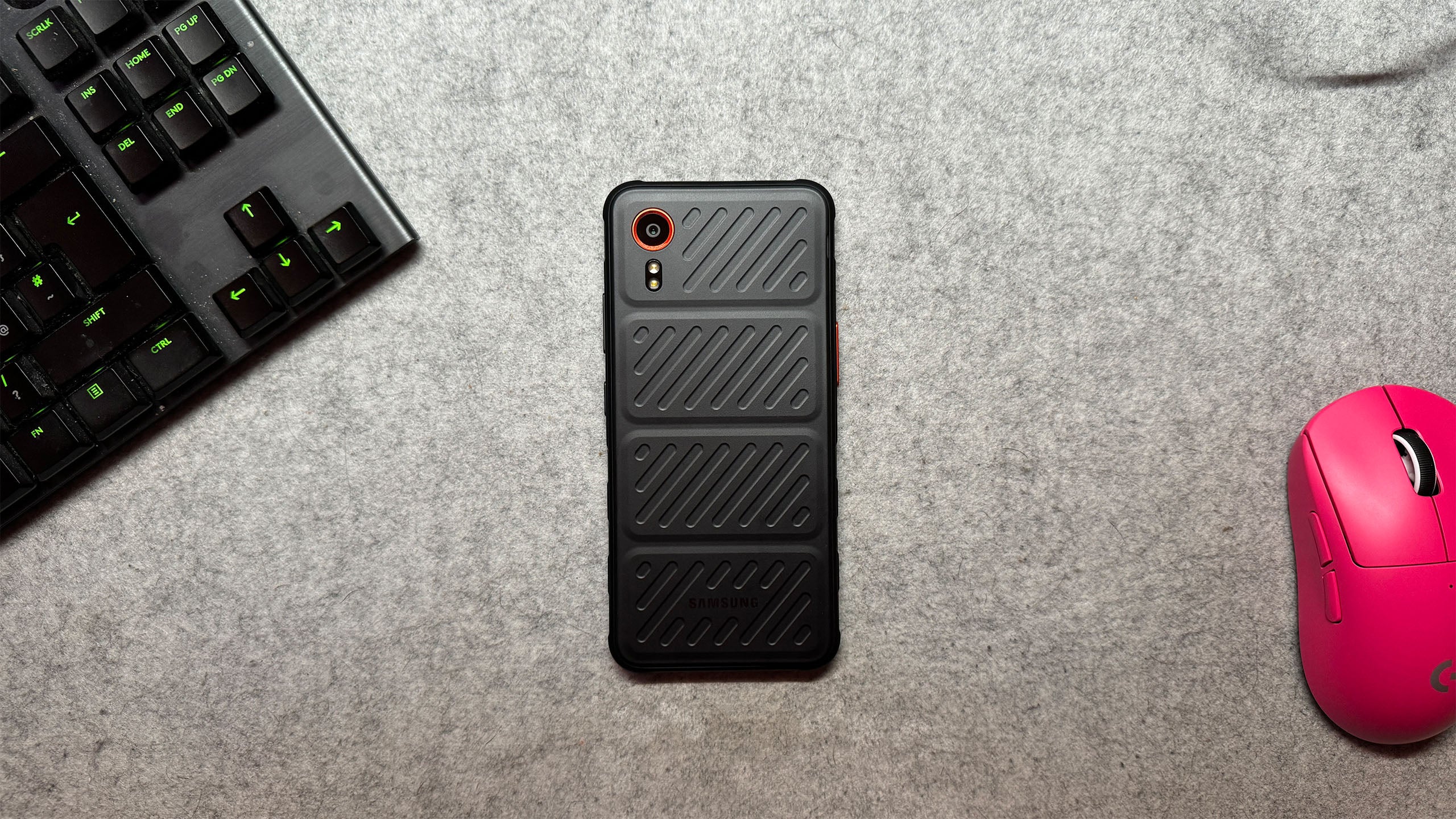Lenovo Legion Phone Duel 2 Review
For the gamers
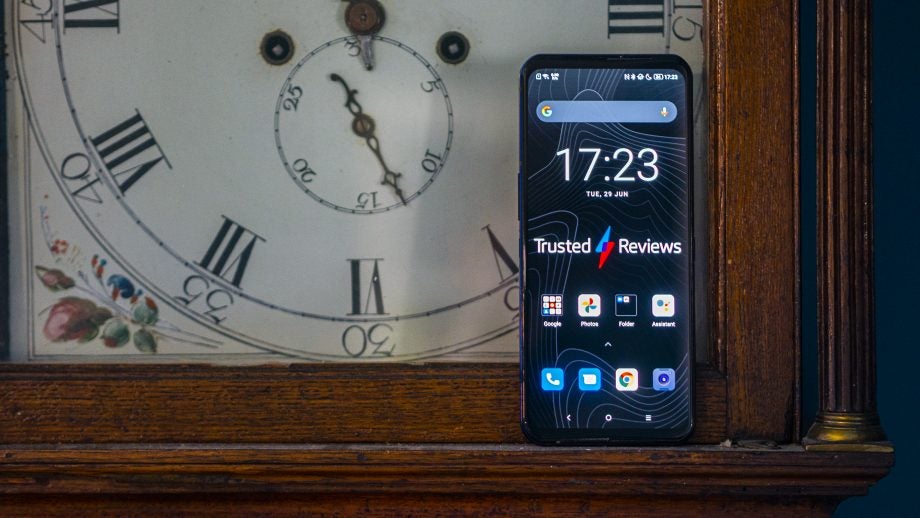

Verdict
The gaming phone as a concept has been around for a while now, and it is still not certain whether this particular niche has any kind of future. Whether or not this is the case, the Lenovo Legion Phone Duel 2 does a lot to justify its existence.
Pros
- Good battery life
- Great performance
- Excellent display and speakers
Cons
- Bad cameras
- Big and bulky
- Ugly aesthetic
Availability
- UKRRP: £699
- USAunavailable
- EuropeRRP: €800
- Canadaunavailable
- Australiaunavailable
Key Features
- Built for gamersThis is a gaming phone with many dedicated features for pushing titles further
- Pop up cameraThe selfie camera pops up on the side of the device
- High-end specsLots of RAM, high-end chipset and fast display
Introduction
Gaming phones are a relatively new concept in the smartphone world and the Lenovo Legion Phone Duel 2 is one of the latest. The premise is simple, these devices will bring all the power you need to really let loose and game the way you want to, at almost any cost.
The hallmarks are big batteries, brash designs and even bigger screens, with over-the-top specifications in almost every area.
Lenovo’s latest effort ticks each of these boxes and then some, going further than much of the competition in its attempt to steal the crown of the best phone for gaming.
It has a landscape-first design, RGB lighting, a motorised selfie-camera, dual turbocharging, air triggers and more RAM and storage than most laptops – but is all of this enough? And in the race to be completely over the top, is enough attention paid to the user experience?
The Lenovo Legion Phone Duel 2 is available now directly from Lenovo in the UK and Europe for £699/€799. No word has been given on availability in the USA and other markets. The base model comes with 12GB of RAM and 256GB of storage, one colour option is available.
Design and Screen
- Flat screen with no curves
- Gorilla Glass 5 on the front and rear
- Made for landscape use in particular
The word ‘Gamer’ when applied to product design has typically meant one thing over the years, a kind of gaudy, bolshy, Lynx deodorant-style of excess.
The Legion Phone embraces this look wholeheartedly, but thankfully it does so with a modicum of restraint.
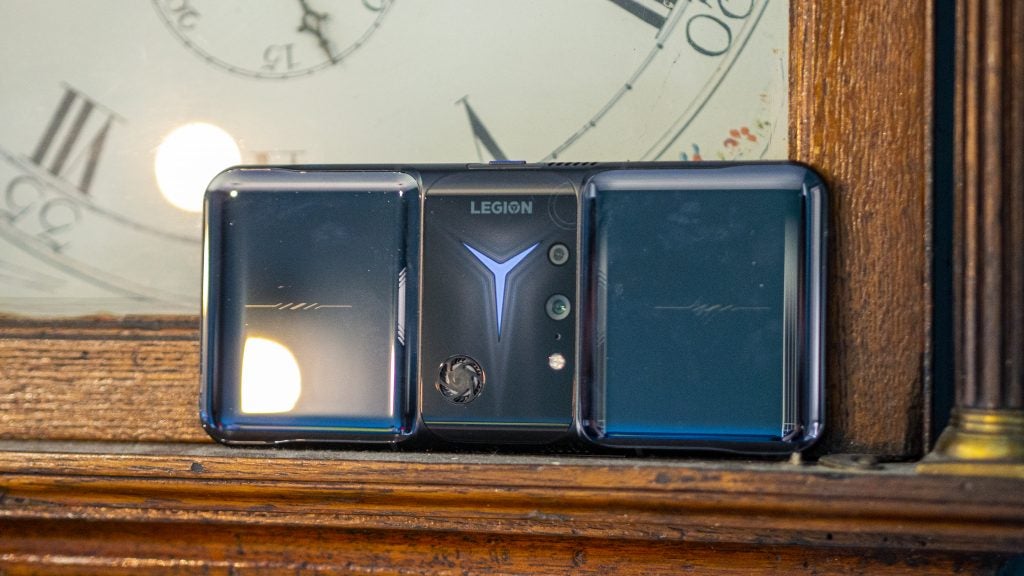
The device is a tasteful black, and offers little clue from the front that it is in fact a gaming device.
On the rear, things become a little different, with a central ‘island’ in the middle which contains all of the cameras (all of which are flush with the casing) an RGB ‘Legion’ logo and a small exhaust fan. That this side of the phone is quite a bit uglier than the front is a given, but besides the point.
This is a device which may not be quite as at home in the boardroom as it is in the living room, but it is certainly an improvement over some of the competition, including the Asus ROG phone.
Looks aside, this is a very large smartphone, one-handed use will be completely out of the question for most. At almost 1cm thick, and weighing in at 259g it is a chunky customer, though the heft is reassuring rather than daunting. This is a device that feels worth the weight and the asking price, with a rock-solid aluminium frame, good build quality and a tough general feel. It is a glass sandwich of course, so we would be very hesitant to subject it to any kind of drop.
So the Legion phone is undoubtedly a gamer phone, however Lenovo has gone a step further in thinking about how these people might use the phone and made inclusions that are not simply skin-deep in terms of their usefulness.
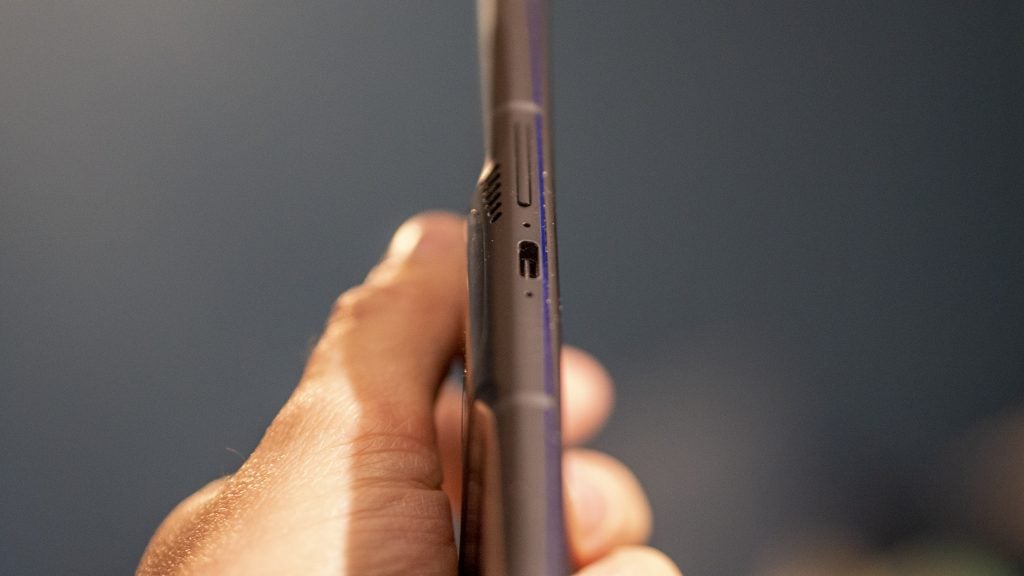
These include a side-mounted USB-C port which allows for dual fast-charging, or for charging while gaming, and a pop-up selfie camera housed under the power button. The latter will be of particular interest for those who like to stream live while gaming.
As a bonus, the included fan seems to aid performance somewhat, kicking in quietly when a game is launched and helping to sustain the thermal performance and avoid throttling.
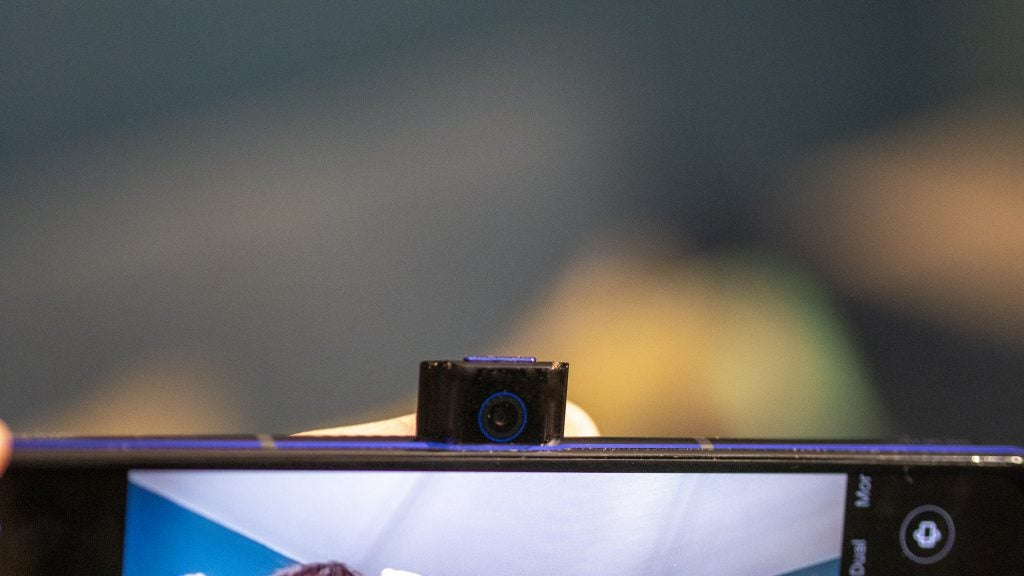
With a gamer-focussed phone comes an obsession with frame rates and high refresh rates, meaning ultimately how ‘smooth’ the phone will feel in general use.
Typical smartphone displays refresh the screen around 60 times per second (though many of the best Android phones have already upped this), whereas the Legion phone can go all the way to 144 times per second. What this means is that not only will the smartphone feel faster than those without this function, but that certain mobile games which support the feature will unlock an extra level of performance.
I certainly found the high refresh rate to be pleasant, and coupled with the fast touch sample response rate this is a phone that flies.
The rest of the display itself is nothing short of cutting-edge and excellent. It expands over 6.92-inches, at a 1080p resolution, offers support for HDR10 content and is an AMOLED panel so delivers infinite blacks and great contrast.
With no pinhole selfie camera or notch either, the screen is entirely uninterrupted, making this great for watching movies, or indeed gaming.
Camera
- Two camera modules, one standard and one wide angle
- No optical stabilisation
- Has a pop-up selfie camera
Though the focus elsewhere is on excess with the Legion phone, there does come a point when cost savings need to be made.
In this case, it is with the camera – though the system provided does look good on paper, it is clear that imaging performance was in no way intended to match processing performance here.
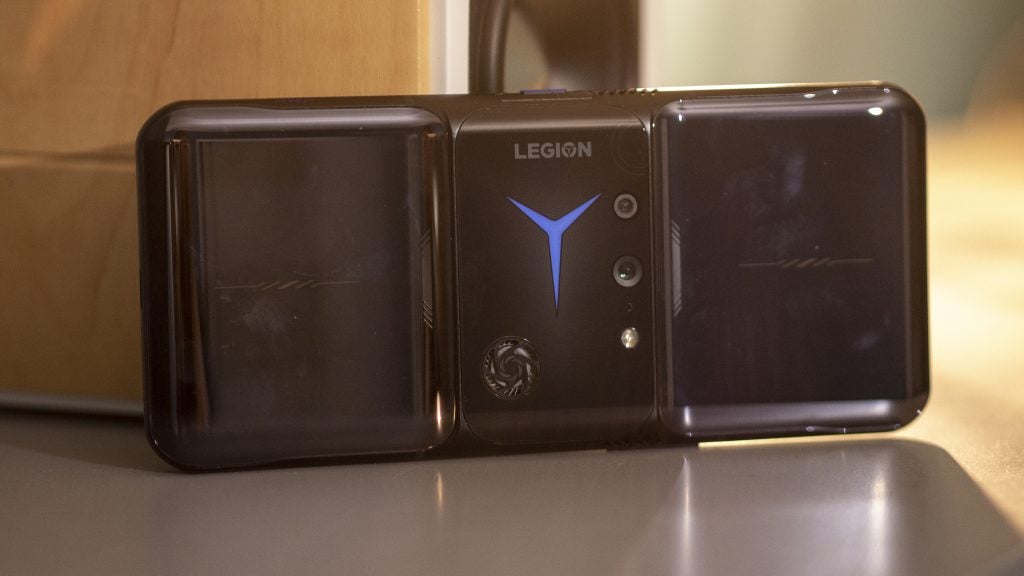
The Legion Phone Dual 2 comes with two sensors in tow, a 64MP f1.9 main sensor and a 16MP f2.2 ultrawide. Neither offers any fancy auto focusing capabilities, optical image stabilisation, claims for image quality or frills in general.
This lack of focus can be seen in the camera app, which is somewhat overstuffed and difficult to navigate. Many options are offered, but with little explanation as to what they achieve. An example is ‘HD photo’ which presumably uses the 64MP resolution to provide a more detailed final image, but this is mere speculation. I couldn’t discern any differences using it during testing.
Moving on to image quality, this is a mixed bag as might be expected. In good light, and with an easy subject (such as a building) image quality, within the context of the price point, is satisfactory.


There is decent detail, reasonable saturation and colours are not overblown like some of the competition.
Things begin to degrade as the light goes however, with the lack of any image stabilisation meaning that shots lack detail and saturation.
The situation does improve slightly with the use of the included ‘Night mode’, but here the best camera phones, especially the likes of the iPhone 12, are more accomplished. Things only deteriorate with the wide angle sensor, which showcases reasonable colour and dynamic range but crushes detail with heavy-handed processing.

The selfie camera is especially disappointing, considering it makes such an entertaining entrance.
I found that the little pop-up sensor prompted envy from family and friends, who were then baffled at the soft, overblown results produced. If you are someone who sets great stock by a selfie, there are again better options available elsewhere, and for a lower price point.
Performance
- Runs a Snapdragon 888
- Comes with 12GB of RAM and 256GB of storage by default
- Cooling fan included to help with sustained performance
The beating heart of any gaming smartphone is of course its processor. To justify their very existence, they need the best of the best and then some, anything to give some feeling of an edge in use.
Lenovo has equipped the Legion phone, suitably, with the best. It features a Snapdragon 888, 12GB of RAM and 256GB of fast UFS3.1 storage, more than enough to enjoy the likes of PUBG. In tandem, they make for a phone which is certainly powerful enough to work as a daily device.
Though the phone feels fast, it doesn’t benchmark considerably higher than the competition, even with the use of its cooling fan. It managed a single core score of 1127 and a multi core score of 3724 in Geekbench 5, which is in line with that achieved by other devices sporting a Snapdragon 888. So though there is no real advantage displayed over the competition, the takeaway is that this is a phone with power to spare.
In games, this is aided by an overlay that appears when swiping down. This offers controls over brightness and volume, the ability to boost the fan speed and, more interestingly, the ability to map the air triggers.
Positioned on the top of the device, these act similarly to the equivalent of the triggers on an Xbox or PlayStation controller, and can be mapped to ‘press’ any part of the screen. An example would be a shooting game, the right air trigger can be mapped to the ‘fire’ button, meaning that the trigger can then be used for that function, freeing up screen space.

Though these don’t work on every game, and are sometimes redundant for those built on swipe touch interfaces, they work very well for console-ports and for emulation. As might be expected, the focus on the haptic feedback for these translates to the rest of the device, its haptic response in general is tight and satisfying.
This is the end of the gamer-themed customisations as far as the software is concerned, the rest is a relatively muted skin of Android that doesn’t offend in any way. It is a ‘stock’ themed version, which means that apps are installed on the homescreen, and that there is also an app drawer etc. The settings menu is where the most customisation can be found, offering finer grain controls over the likes of the screen white point and refresh rates.
The front-firing speakers are a pleasant surprise. They are loud, bright, offer some semblance of stereo separation and even some decent bass. I found them to easily be the equal of a £20 Bluetooth speaker, and they are a real treat for watching movies and TV.
Battery life
- 5500mAh battery
- Capable of ‘dual’ fast charging
- Comes with a fast charger in the box
It has been said already that the Legion phone is a very large handset, one which easily wears the ugly moniker of ‘phablet’, being big is part of its core identity.
A pleasant side effect of its extra girth is the easy inclusion of a monster battery pack inside. At 5500mAh it is among the largest available in a device at this price point, and it is definitely needed.
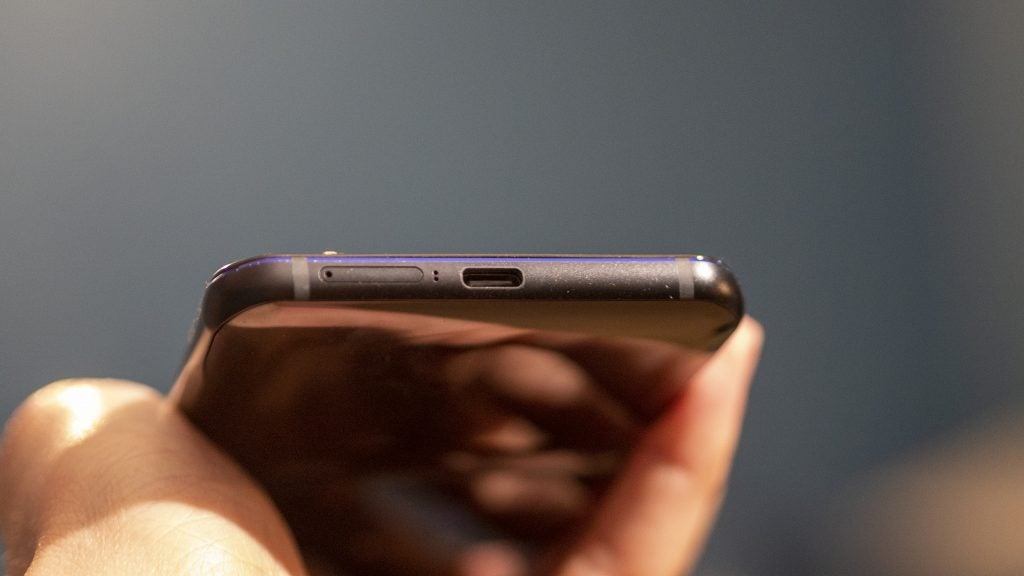
On an average day, I managed around five hours of screen-on time, with a combination of messaging, watching video, listening to music, browsing the internet and indulging in a little mobile gaming.
So for most people, the Legion Phone Duel 2 will have enough battery to make it through the day and into a second without too much issue.
The situation of course changes with the inclusion of heavier gaming sessions. When playing the likes of PUBG or more intensive titles, power consumption increased considerably, dropping the screen on time by around 90 min in most cases. This is still a solid showing, those looking for long gaming sessions will be well served.
And when the time comes to do a quick top-up, the Legion Phone Duel 2 has a trick up its sleeve in dual fast-charging.
It can accept two charging cables at once (both of these plus a fast charger are included in the box). With both of these attached and with the compatible fast charger used, I managed to top up over 90% in 30 min, which is very fast indeed.
Really the only knock against the Legion phone in the battery department is the lack of wireless charging, though whether this qualifies as a flaw will depend heavily on your personal tastes.
Best Offers
Should you buy it?
You are a keen mobile gamer: The Legion phone is a gamer’s dream, offering a host of features and customisation options.
You dislike brash design: There is no attempt at restraint in the design of the Legion phone, which is either a good thing or a bad thing depending on tastes.
Final Thoughts
Beyond its bold and gaudy exterior lies an exceptionally capable and mostly refined device that is a pleasure to use. Though it is big and bulky, it is solidly built and feels premium in the hand. Its display is a pleasure to use through and through, and the in-built speakers are among the better options available on the market today.
FAQs
Yes, this phone supports 5G networks
There is no IP rating here
There’s fast wired charging, but no wireless charging

